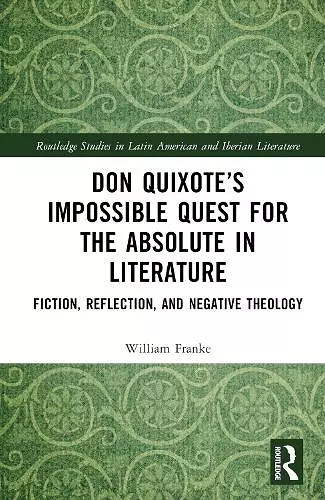Don Quixote’s Impossible Quest for the Absolute in Literature
Fiction, Reflection, and Negative Theology
Format:Hardback
Publisher:Taylor & Francis Ltd
Published:31st Jul '24
Currently unavailable, and unfortunately no date known when it will be back

This book offers a reading particularly of Part II of Don Quixote, a reading that is embedded in a philosophical reflection on the revelation of religious truth in and through literature. Part II of Don Quixote is the far richer part for its meta-literary reflection on the novel itself as a genre and on life as such seen through the lens of self-reflection. The author has treated the phenomenon of modern self-reflexivity as originally theological in nature in previous publications (notably Dante’s Paradiso and the Theological Origins of Modern Thought: Toward a Speculative Philosophy of Self-Reflection, Routledge, 2021). The present endeavor expands this overall intellectual project, extending it into detailed consideration of what is recognizably another nodal great work inaugurating unprecedented forms of self-reflection in the early modern period. Reading the founding texts of literary and cultural tradition in this negative-theological key proves crucial to allowing them to release the full force of their religious vision in the present age, despite its sometimes obstinate secularity.
This reading absorbs and reconciles the religious and secular readings of Miguel de Unamuno and José Ortega y Gasset, two of Spain’s outstanding philosophical luminaries. Both thinkers based their entire philosophies and their analyses of the Spanish national character and destiny on their interpretations of the Quixote. Negative theology deploys critical reason that critiques the limits of reason itself and opens toward an unfathomable (un)ground of All. Such speculative interpretation performs a synthesis of the secularizing and sacralizing tendencies that are both sublimely operative in the text of the Quixote. It thereby enables the work to emerge in the fully parodic and paradoxical vitality that other interpretations, governed by one paradigm or the other, access only partially. Rather than falling into one camp or the other, the proposed approach combines and resources both heritages, sacred and secular, in their deepest synergisms. Spanish baroque mysticism and contemporary post-secular thought are made to converge in highlighting the blessed, even sacred, donation that literature like Don Quixote preserves and transmits as our most precious and saving cultural heritage.
"This is one of the very best, most interesting studies of Cervantes’ Don Quixote that I have read in some time. . . . I consistently found myself engaged by the argument, fascinated by the detailed analyses, and impressed by the depth of thought in evidence in this work. It’s clear that Franke really “gets” the complexity and the importance of Don Quixote, and he does a superb job communicating this to the reader. . . .In a scholarly landscape that is littered with studies of Don Quixote that often fail to do justice to Cervantes’ text, Franke’s study stands out for the way in which it truly captures the profundity of the work."
-Anthony J. Cascardi, Sidney and Margaret Distinguished Professor of Comparative Literature, University of California, Berkeley
A celebrated scholar of Dante and of the discipline known as apophatic theology or negative theology, William Franke in Don Quixote’s Impossible Quest for the Absolute in Literature offers us a tour-de force interpretation of how Cervantes searches for God’s revelation of truth in theologically diverse apophatic discourses. Franke’s exegetical reflections converse with Ortega’s, Unamuno’s, and Zambrano’s respective meditations on Cervantes’s masterpiece, allowing the reader to get a taste of the parodic laughter in DonQuixote, a mode of discourse that speaks (or rather un-speaks) of the impossible quest for the transcendent and the divine. Franke’s is a complex and excellent book that sheds insight upon Don Quixote’s experience of the divine around him.
-Antonio Cortijo Ocaña, Professor, University of California, Santa Barbara
William Franke’s Don Quixote’s Impossible Quest for the Absolute in Literature: Fiction, Reflection, and Negative Theology could hardly be a more ambitious project, and I believe that the results are brilliant. Professor Franke has analyzed Don Quixote using his unique and wide-ranging background in literature, culture, theology, and philosophy, not to mention his familiarity with the meta- offspring of Cervantes’s work. I find the framing of the theses and arguments to be superb. The critic lays the foundations for his particular readings, upon which readers can reflect and debate.
-Edward H. Friedman, Gertrude Conaway Vanderbilt Professor in the Humanities, Vanderbilt University, Tennessee
ISBN: 9781032688961
Dimensions: unknown
Weight: 500g
240 pages